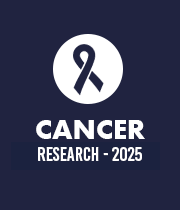Treatments of Cancer
Every year, cancer affects millions of people throughout the world. Despite significant advances in medicine, there are still many difficulties that need to be addressed in order to enhance cancer treatment. At the transition stage of cancer when it shifts from a localized to a systemic form of disease with metastases, systemic cancer treatments are required. Systemic cancer treatment can be either prophylactic (for example, post-surgery) or therapeutic. The present cancer research scenario is diverse with ample opportunities for constant therapeutic improvement that consider not just patient recovery but also their well-being during treatment. Radiomics, immunotherapy, and exosomes are the three entries that have grown the most in the past decade.
- Surgery
- Chemotherapy
- Radiation Therapy
- Stem Cell (Bone Marrow) Transplant
- Immunotherapy (Biological Therapy)
- Targeted Drug Therapy
- Alternative Medicine
- Laser Therapy
- Palliative Care
- Cancer vaccine
- Nanomedicine
- Precision medicine
- Radiomics
- Exosomes

Rajvir Dahiya
University of California San Francisco, United States
Atif A Ahmed
Seattle Children’s Hospital, United States
Michael Thompson
University of Toronto, Canada
Mariola Wioletta Borowska
Maria Sklodowska-Curie National Research Institute of Oncology, Poland
Andrea González Báez
Autonomous University of Nuevo Leon, Mexico
Qian Zhang
The Affiliated Changzhou Second People’s Hospital of Nanjing Medical University, China


Title : A novel mRNA genomic technology for precision medicine, early cancer diagnosis, prognosis, treatment follow-up and cancer gene therapy
Rajvir Dahiya, University of California San Francisco, United States
Title : The future of pharmacogenetic polymorphism, pharmacogenomics and pharmamicrobiome in cancer treatment
Bene Ekine-Afolabi, University of East London, United Kingdom
Title : Biosensor-based detection of cancer biomarkers
Michael Thompson, University of Toronto, Canada
Title : Hospital care for cancer patients - safety, quality of care, education and respect for patient’s rights
Mariola Wioletta Borowska, Maria Sklodowska-Curie National Research Institute of Oncology, Poland
Title : Importin7 induces M2 macrophage and promotes the progress of colorectal cancer by regulating the nucleus translocation of GRP78
Changjiang Yang, Peking University People's Hospital, China
Title : Cancer-associated fibroblasts derived soluble CADM1 predicts response to neoadjuvant chemoimmunotherapy in lung cancer
Jian Li, Shanghai Jiaotong University, China